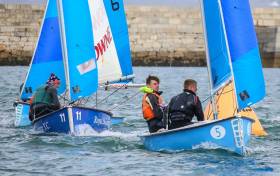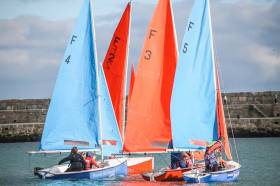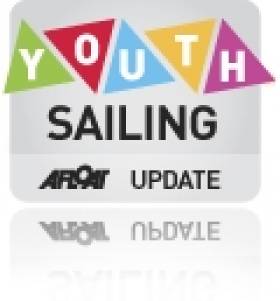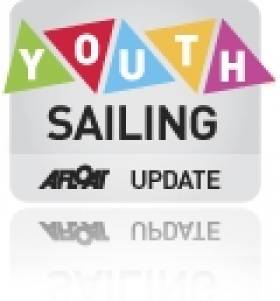Displaying items by tag: all ireland junior sailing championships
Royal Cork Yacht Club's Atlee Kohl Wins All Ireland Junior Title
Royal Cork Yacht Club's Atlee Kohl has won the 2018 Junior Irish Sailing All Ireland Sailing Championships sailed in Firefly dinghies in Dun Laoghaire Harbour today.
With only a single point between the top three boats, first and second place was decided on a tie-breaker, with a nail-biting last race seeing Kohl, nominated for the competition by the Laser 4.7s and 29er classes, snatching the title from last year’s winner Micheal O’Suilleabhain from Kinsale. Dubliner Tom Higgins of the Royal St. George Yacht Club came in third place just one point behind after seven races.
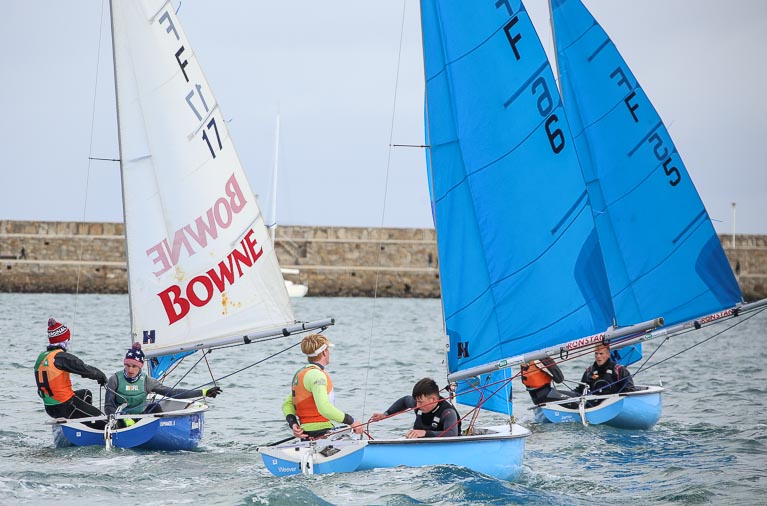 Tight racing downwind at the All Ireland event Photo: Afloat.ie
Tight racing downwind at the All Ireland event Photo: Afloat.ie
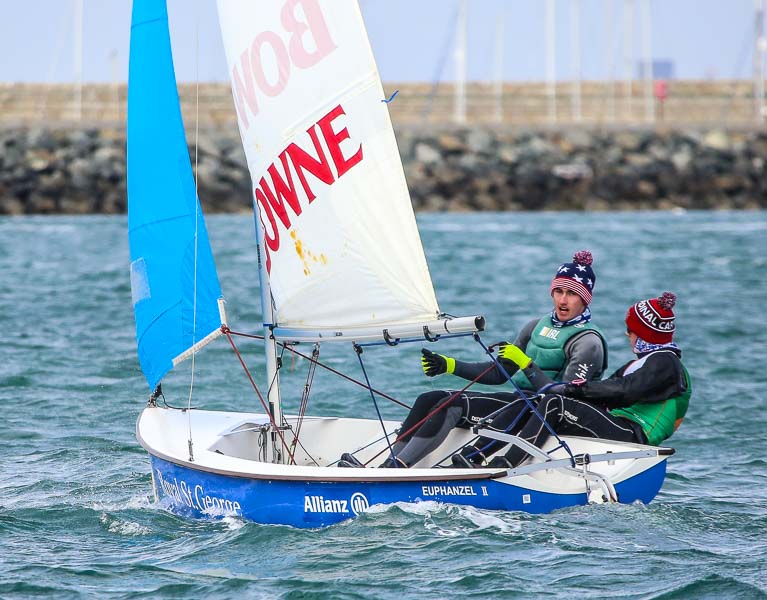 Tom Higgins and Henry Higgins Photo: Afloat.ie
Tom Higgins and Henry Higgins Photo: Afloat.ie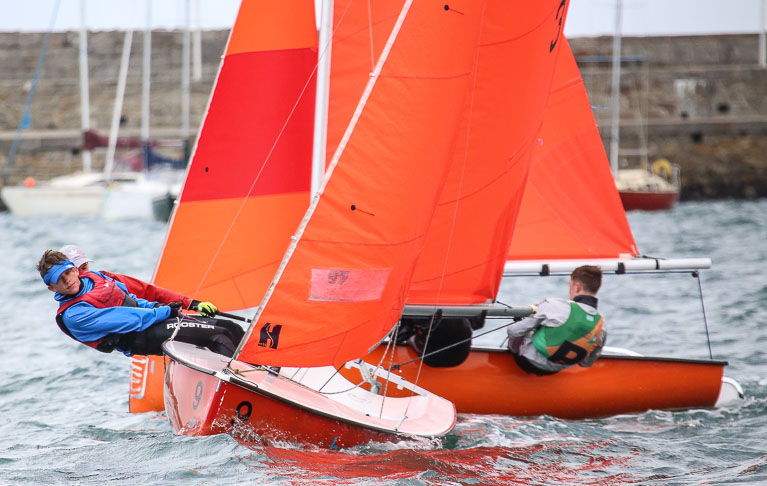 Hugh O'Connor and Hugh Lynch Photo: Afloat.ie
Hugh O'Connor and Hugh Lynch Photo: Afloat.ie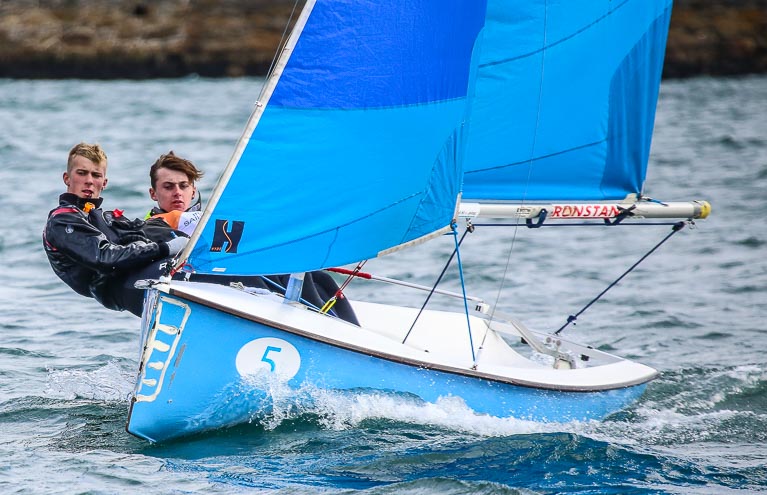 Micheál O' Sullivan and Mikey Carroll Photo: Afloat.ie
Micheál O' Sullivan and Mikey Carroll Photo: Afloat.ie
Sixteen nominees from various different Irish Sailing affiliated classes competed in the event in the Royal St George Yacht Club. Racing took place both inside and outside the harbour, with gusts inside the harbour today of up to 30 knots.
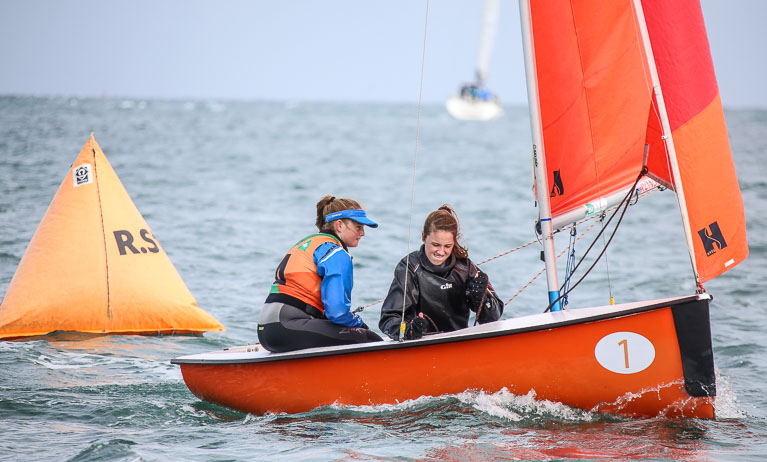 Photo: Alana Coakley (RStGYC) and Ellie Cunnane Afloat.ie
Photo: Alana Coakley (RStGYC) and Ellie Cunnane Afloat.ie
Final results: 1st place Atlee Kohl (RCYC) with crew Jonathan O’Shaughnessy; 2nd place was Micheal O’Suilleabhain (Kinsale YC) with crew Michael Carroll; 3rd place was Tom Higgins with crew Henry Higgins (RStGYC); Alana Coakley (RStGYC) crewing with Ellie Cunnane was First Girl. Full results of the event are available here
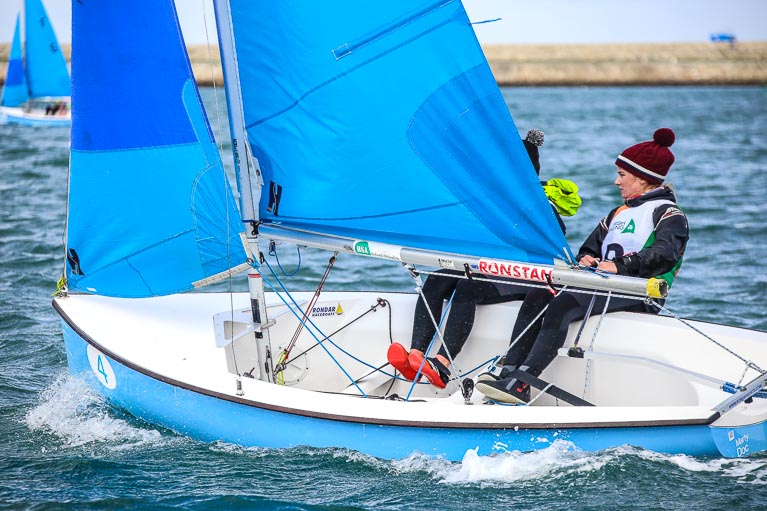 Grace O' Beirne and Kathy Kelly Photo: Afloat.ie
Grace O' Beirne and Kathy Kelly Photo: Afloat.ie
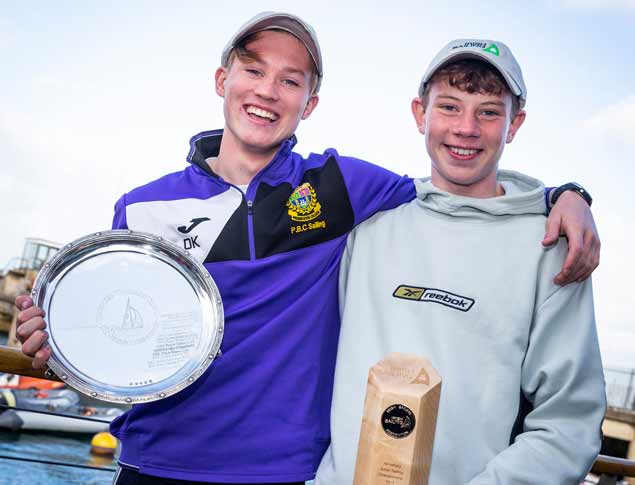 Winners Atlee Kohl (left) and crew Jonathan O’Shaughnessy Photo: David Branigan/Irish Sailing
Winners Atlee Kohl (left) and crew Jonathan O’Shaughnessy Photo: David Branigan/Irish Sailing
Last Chance For Nominations To Junior Sailing All Irelands
The Royal St George Yacht Club in Dun Laoghaire will host the 2018 All Ireland Junior Sailing Championship over the weekend of 29-30 September.
Irish Sailing has announced that this year’s youth event will be raced in the Firefly dinghy, which celebrated its 70th anniversary in 2016.
Class nominations close at noon today (Tuesday 4 September) ahead of the nominations meeting at 5pm this evening.
Entry forms will go out to successful nominees this Thursday 6 September and are due within a week, with successful entries announced on the evening of Friday 14 September.
The junior event takes place a week before the senior All Irelands on Lough Ree.
Nine Wins Gives Lyden Junior All Ireland Sailing Title
#youthsailing – Nine wins from nine races gave Fionn Lyden the Junior All Ireland Sailing Championship this afternoon in Schull, West Cork. Scroll down to download full results as a pdf.
Lyden, a member of Schull's Youth Team that lifted the under 21 trophy at the Wilson trophy at West Kirby in the UK in May, capped off the 2012 season with the storming win in the locally built TR3.6 dinghy.
Conditions remained ideal for the Irish Sailing Association (ISA) event with a steady easterly breeze of between 10 and 12 knots on the windward leeward courses today.
Under the management of David Harte, racing got off to a good start at 10.30am and Fionn and his crew of Anna O'Regan were quick to take the lead yet again. Continuing their domination of the fleet, the duo from Schull Community College Sailing Club were unbeatable in the locally built boat TR3.6 dinghy as they won all three of the remaining fleet races putting them on 7 points entering the medal race followed by Finn Lynch and his crew Sean Donnelly on 24 points and Eoin Lyden and Darragh McCormack on 28 points in third place.
At 1.25pm the top 10 sailors, consisting of eight boys and two girls, crossed the start line for the last time. Fionn got off to a bad start but echoing his skill from the previous races, he sailed hard and rounded the first mark in first place. The wind dropped off to only 3 knots at the windward mark but Fionn extended his lead while his cousin Eoin Lyden chased him in vain from second place. Never wavering from his leading position, Fionn crossed the finish line in first place.
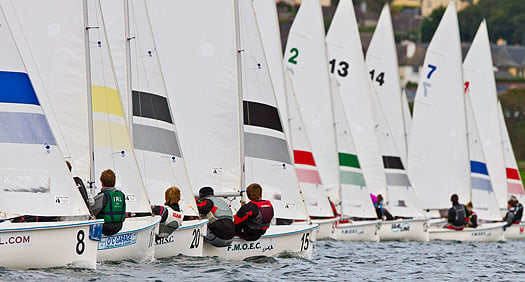
The TR3.6 dinghy fleet in action. Photo: Brian Carlin
Meanwhile Finn Lynch from the National Yacht Club and Eoin Lyden from Royal Cork Yacht Club had been fighting it out for the silver. Finn had a four point lead going in to the medal race but the 2012 ISAF Youth Worlds silver medallist had a disastrous final race finishing in 10th place. The additional 20 points meant he dropped to third overall to take the bronze.
Eoin however sailed a great race finishing in second place moving him up to second overall to take the silver.
Competing for the title of First Girl were Aisling Keller from Lough Derg and Laura Gilmore from Northern Ireland. Both girls had sailed a strong regatta with a total of nine top 10 finishes between them but ultimately a 4th in the medal race for Aisling saw her finish the regatta in 7th overall taking the prize for Frist Girl with Laura finishing in 9th overall.



























